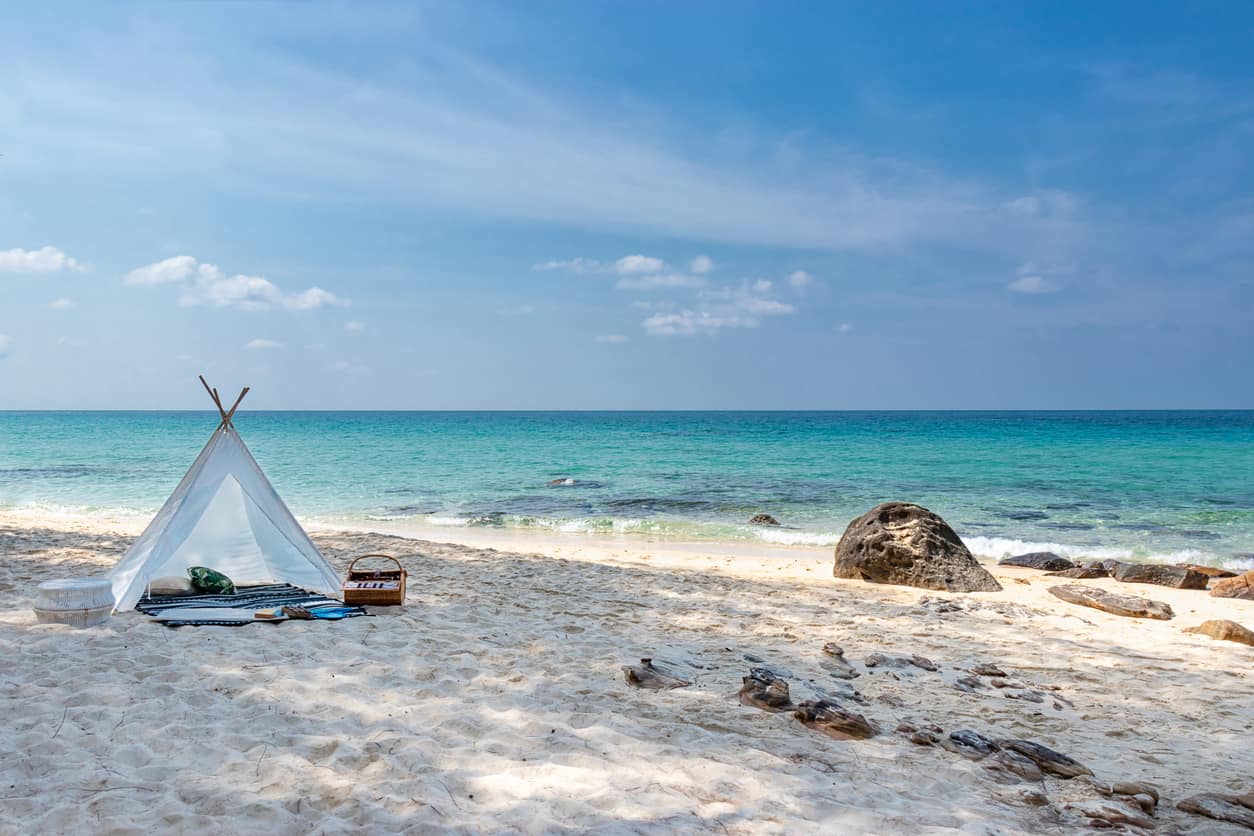Tropical beach camping offers a unique blend of adventure and serenity, combining the thrill of outdoor living with the mesmerizing beauty of coastal environments. Let me guide you through everything you need to know for a successful tropical beach camping experience.
Planning Your Beach Camping Adventure
Permits and Reservations
Beach camping locations often require advance booking, especially during peak seasons. Many popular beach camping destinations fill up quickly, so securing your spot early is crucial. For example, some locations like the Kalalau Trail require specific permits that become available 90 days in advance.
Site Selection
Choose your campsite carefully, considering factors like:
- Distance from the high tide line
- Natural windbreaks
- Proximity to facilities
- Access to fresh water
- Presence of natural shade
Essential Gear for Tropical Conditions

Shelter Systems
A pop-up tent with proper flooring and sand stakes is essential for beach camping. Ensure your tent can withstand coastal winds and provide adequate ventilation for tropical conditions.
Sleeping Equipment
Pack lightweight sleeping bags or blankets suitable for warm weather. Consider bringing:
- Sleeping pad or air mattress
- Travel pillow
- Ground cover or beach blanket
- Mosquito netting
Beach-Specific Gear
- Beach umbrella or shade tent
- Sand stakes for securing equipment
- Whisk broom for sand management
- Water shoes
- Broad-brimmed hat
Environmental Stewardship
Leave No Trace Practices
Practice responsible camping by:
- Using established campsites
- Properly disposing of waste
- Minimizing campfire impacts
- Respecting wildlife
- Leaving natural items undisturbed
Wildlife Protection
Keep a safe distance from wildlife and never feed local animals. Store food properly to avoid attracting unwanted visitors.
Safety Considerations
Water Safety
- Always swim with a buddy
- Learn to identify rip currents
- Follow beach warning flags
- Stay within your swimming abilities
Weather Monitoring
Beach weather can be unpredictable, with the potential for sudden storms. Monitor weather forecasts and have an emergency plan.
Practical Tips for Comfort
Sand Management
Keep sand at bay by:
- Using a tarp outside your tent
- Bringing a water bucket and towels for cleaning
- Having a broom and dustpan handy
Food and Water
- Pack a reliable cooler
- Bring frozen water containers
- Include electrolyte drinks
- Plan simple, sand-resistant meals
Vehicle Considerations
Car Camping Tips
If you’re driving to your campsite:
- Choose a lightweight trailer if applicable
- Avoid driving too far on sand
- Park on stable ground
- Have recovery equipment ready
Cultural Awareness
Respect local communities and regulations by:
- Following posted rules
- Maintaining quiet hours
- Using designated areas
- Preserving cultural sites
Location Highlights
Popular Destinations
- Florida Keys: Crystal-clear waters and excellent snorkeling
- Big Sur: Dramatic coastline with redwood forests
- Olympic National Park: Diverse landscapes with tide pools
- Assateague Island: Wild horses and pristine beaches
Remember that tropical beach camping requires careful planning and respect for the environment. Following these guidelines will prepare you for an unforgettable coastal camping experience while preserving these beautiful locations for future generations.
Frequently Asked Questions
How far in advance should I book a tropical beach camping spot?
Book your camping spot at least 3-4 months ahead, especially for popular destinations during peak season. Some locations release permits 90 days in advance and fill up quickly.
What’s the best tent for beach camping?
Choose a tent with strong poles, excellent ventilation, and sand stakes. Pop-up tents with mesh panels work well for tropical conditions and easy setup.
How do I protect my food from sand and heat?
Store food in sealed containers, use a high-quality cooler with frozen water bottles, and keep everything in the shade. Pack simple, non-perishable meals that won’t spoil quickly.
What should I do if caught in a tropical storm while camping?
Monitor weather forecasts daily, prepare an evacuation plan, and secure all camping gear. If possible, relocate to higher ground or seek sturdy shelter.
How do I manage drinking water needs at the beach?
Bring one gallon per person per day, plus extra for cooking and cleaning. Pack a reliable water filter and know local water sources.
What’s the best way to deal with sand in my tent?
Use a tarp outside your tent entrance, bring a whisk broom for regular sweeping, and keep a water bucket nearby for rinsing feet.
Are campfires allowed on tropical beaches?
Check local regulations first. Many beaches prohibit fires or require permits. Use designated fire rings when available and never bury coals in sand.
How do I protect myself from insects while beach camping?
Use mosquito netting around your sleeping area, wear light-colored clothing, and apply EPA-approved insect repellent. Keep your tent zipped closed.
What should I do about high tide?
Set up camp well above the high-tide line. Check local tide tables and mark the high tide line before setting up your campsite.
How do I handle bathroom needs when facilities aren’t available?
Use designated facilities when possible. Otherwise, dig a cathole 200 feet from water sources and camp areas. Pack out all toilet paper.
What’s the best sleeping setup for tropical beach camping?
Use a lightweight sleeping bag or sheet, elevate your sleeping pad, and ensure good ventilation. Consider a hammock with bug netting for better airflow.
How do I respect local wildlife while camping?
Keep food secured, maintain distance from animals, avoid flash photography at night, and never feed wildlife. Learn about local species before your trip.
What emergency supplies should I pack?
Bring a first-aid kit, emergency shelter, waterproof matches, navigation tools, and communication devices. Include basic repair items for gear.
How do I keep electronics safe from sand and moisture?
Store electronics in waterproof containers with silica gel packets. Keep devices in ziplock bags when not in use.
What’s the best way to prevent heat exhaustion while beach camping?
Stay hydrated, camp in shaded areas, plan activities for cooler hours, and bring electrolyte supplements. Watch for signs of heat stress.

Leave a Reply